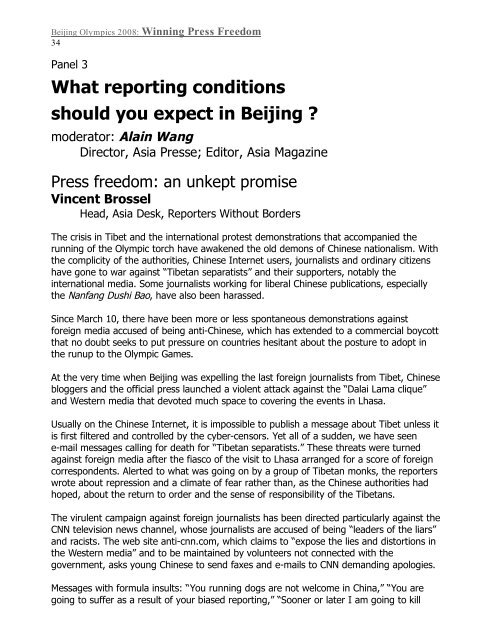Beijing Olympics 2008: Winning Press Freedom - World Press ...
Beijing Olympics 2008: Winning Press Freedom - World Press ...
Beijing Olympics 2008: Winning Press Freedom - World Press ...
Create successful ePaper yourself
Turn your PDF publications into a flip-book with our unique Google optimized e-Paper software.
<strong>Beijing</strong> <strong>Olympics</strong> <strong>2008</strong>: <strong>Winning</strong> <strong>Press</strong> <strong>Freedom</strong><br />
34<br />
Panel 3<br />
What reporting conditions<br />
should you expect in <strong>Beijing</strong> ?<br />
moderator: Alain Wang<br />
Director, Asia <strong>Press</strong>e; Editor, Asia Magazine<br />
<strong>Press</strong> freedom: an unkept promise<br />
Vincent Brossel<br />
Head, Asia Desk, Reporters Without Borders<br />
The crisis in Tibet and the international protest demonstrations that accompanied the<br />
running of the Olympic torch have awakened the old demons of Chinese nationalism. With<br />
the complicity of the authorities, Chinese Internet users, journalists and ordinary citizens<br />
have gone to war against “Tibetan separatists” and their supporters, notably the<br />
international media. Some journalists working for liberal Chinese publications, especially<br />
the Nanfang Dushi Bao, have also been harassed.<br />
Since March 10, there have been more or less spontaneous demonstrations against<br />
foreign media accused of being anti-Chinese, which has extended to a commercial boycott<br />
that no doubt seeks to put pressure on countries hesitant about the posture to adopt in<br />
the runup to the Olympic Games.<br />
At the very time when <strong>Beijing</strong> was expelling the last foreign journalists from Tibet, Chinese<br />
bloggers and the official press launched a violent attack against the “Dalai Lama clique”<br />
and Western media that devoted much space to covering the events in Lhasa.<br />
Usually on the Chinese Internet, it is impossible to publish a message about Tibet unless it<br />
is first filtered and controlled by the cyber-censors. Yet all of a sudden, we have seen<br />
e-mail messages calling for death for “Tibetan separatists.” These threats were turned<br />
against foreign media after the fiasco of the visit to Lhasa arranged for a score of foreign<br />
correspondents. Alerted to what was going on by a group of Tibetan monks, the reporters<br />
wrote about repression and a climate of fear rather than, as the Chinese authorities had<br />
hoped, about the return to order and the sense of responsibility of the Tibetans.<br />
The virulent campaign against foreign journalists has been directed particularly against the<br />
CNN television news channel, whose journalists are accused of being “leaders of the liars”<br />
and racists. The web site anti-cnn.com, which claims to “expose the lies and distortions in<br />
the Western media” and to be maintained by volunteers not connected with the<br />
government, asks young Chinese to send faxes and e-mails to CNN demanding apologies.<br />
Messages with formula insults: “You running dogs are not welcome in China,” “You are<br />
going to suffer as a result of your biased reporting,” “Sooner or later I am going to kill





